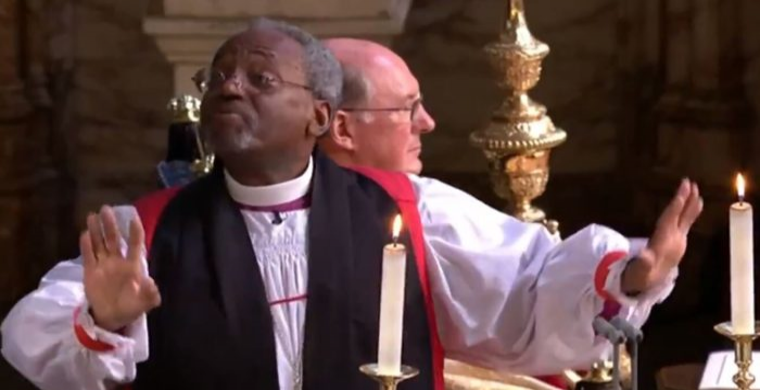Episcopal Church Marriages Plunge by Two-Thirds
By Jeffrey Walton
https://juicyecumenism.com/2020/10/23/episcopal-church-marriages/
October 23, 2020
Episcopalians, briefly in the limelight as Presiding Bishop Michael Curry preached at the 2018 wedding of the Duke and Duchess of Sussex, aren't marrying much of anybody these days. This according to an annual release of church statistics that reveal marriages in the denomination have declined by 66% since 2003 and baptisms are down by more than half.
In short, the old adage of clergy responsibility to preside over "hatch, match and dispatch" is no longer occurring.
Gradual decline of attendance and membership in the 1.6 million-member denomination is "no news" news, but (paired with the release of Presbyterian Church (USA) statistics in the spring) is one of two sure-fire blog entries that annually draws readers.
After posting my October 7 report, it took the denomination's Episcopal News Service another nine days to offer coverage. I'll note that the candid and well-sourced ENS report was published at exactly 5:30 p.m. on a Friday. Readers can draw their own conclusion.
Attendance and membership are two objective metrics that garner attention, but like an automobile speedometer, they only indicate how the denomination is moving at present. I've argued before that other metrics, especially marriages and baptisms, are more valuable in that they are leading indicators.
Marriage Isn't What Brings Us Together Today
In 2003 the Episcopal Church conducted 19,017 marriages. That year is a demarcation point when a divorced and openly partnered gay man, Gene Robinson, was elected and consecrated as bishop for the Episcopal Diocese of New Hampshire, exacerbating denominational strife that had been unfolding for decades. Large-scale departures began with the 2006 election of Katharine Jefferts Schori as Presiding Bishop.
Last year (2019) marriages conducted in the Episcopal Church were 6,484 (down 66%). A two-thirds decline in marriages. An 11 percent decline was reported in 2019 alone.
Reasons for this decline are manifold -- marriage rates are down among the U.S. population (although not anywhere near that much). Those who do marry increasingly opt for ceremonies at secular venues like vineyards, beaches or botanical gardens -- venues which don't require ordained Episcopal clergy.
That being acknowledged, it is ironic how redefinition of marriage within the Episcopal Church corresponds with fewer marriages, just as proclamations of "inclusion" led to including fewer and fewer people in the life the of church.
I noted in 2015 that Episcopal Church officials enacted policies that the majority of Anglicans worldwide refute as contrary to both scripture and tradition. Did the arrival of gender-neutral marriage rites slow the rate of marriage within the church? Possibly. Did a doctrinal change in the understanding of what marriage is -- from an institution that forms families to something that is an expression of personal fulfillment and autonomy -- reduce those rates? I think so.
Some on mainline seminary campuses now advocate for marriage contracts with an expiration date, rather than 'until death do us part'. This is a concession to the culture of personal autonomy and a departure from what the church has historically understood.
In enacting the gender-neutral marriage rite in 2015, Episcopalians unilaterally redefined marriage and further distancing themselves from Christendom. There is no remaining reason why Episcopalians untethered from the church's historic witness should stop making changes.
Something in the Water
The Episcopal Church tracks adult and child baptisms, which provide helpful numbers to understand both procreation and evangelism.
In 2019, the church reported 19,716 children and 3,866 adults baptized, down from 46,079 children and 7,773 adults in 2003. That is a decline of 57% and 50%, respectively.
Episcopalians have lower rates of childbearing than Americans overall, and the church is nearly 90% white -- a demographic that (excepting Mormon-rich Utah) is far below the 2.1 children-per-woman rate of replacement. Pew Research Center data indicates that the teenage children of Mainline Protestants (including Episcopalians) are far less likely (55%) to share their parents' faith than the children of Evangelicals (80%) or Roman Catholics (81%). A smaller percentage of a smaller number of children are continuing in the Episcopal Church.
Decline in adult baptisms is also troubling: reflecting a universalist theology that pervades the church. Outreach common in the Episcopal Church 20 years ago -- such as Alpha -- is no longer commonplace.
Why should congregants take the social risk of asking a friend or neighbor to join them at a church if there is no eternal destiny at stake? If Episcopalians offer something that is not unique, but merely an elective offering among a buffet line of equally-valid "truths", then why should people feel the need to share? If "love is love" as rainbow-festooned church signs proclaim, what does it matter if a person knows Christ or not?
The catechized will note that Eros is not Agape, and that Jesus' claim to be the unique Son of God commands a different level of devotion than that of a wise philosopher. But with fewer Episcopalians likely in the next 20 years, we can expect fewer will hear that message from the Episcopal Church.
Update: After completing this blog entry, but before its publication, I read a piece by David Goodhew of The Centre for Church Growth Research at Durham University that offers analysis and touches on some of the same points. Head over to The Living Church's Covenant blog to read it.














